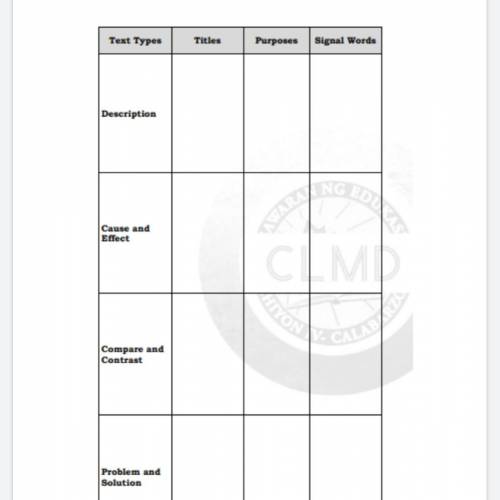
Answers: 2


Another question on English

English, 21.06.2019 12:30
Read the text evidence. "fish cheeks" then my father poked his chopsticks just below the fish eye and plucked out the soft meat. "amy, your favorite," he said, offering me the tender fish cheek. i wanted to disappear. "broken chain" alfonso thought he would look cool with his hair razored into a v in the back and streaked purple. but he knew his mother wouldn't go for it. and his father, who was puro mexicano, would sit in his chair after work, sullen as a toad, and call him "sissy." which theme does the text evidence from the essay and short story support? one’s cultural background affects who he or she is. manners are important to use in life. a person’s outward appearance can be deceiving. family always comes first.
Answers: 1

English, 21.06.2019 21:10
Read this excerpt from the scarlet letter by nathaniel hawthorne and complete the sentence that follows. she had wandered, without rule or guidance, in a moral wilderness; as vast, as intricate and shadowy, as the untamed forest, amid the gloom of which they were now holding a colloquy that was to decide their fate. the author uses the point of view in the excerpt.
Answers: 1

English, 22.06.2019 04:50
Read the passage, then answer the question that follows. no one could have seen it at the time, but the invention of beet sugar was not just a challenge to cane. it was a hint—just a glimpse, like a twist that comes about two thirds of the way through a movie—that the end of the age of sugar was in sight. for beet sugar showed that in order to create that perfect sweetness you did not need slaves, you did not need plantations, in fact you did not even need cane. beet sugar was a foreshadowing of what we have today: the age of science, in which sweetness is a product of chemistry, not whips. in 1854 only 11 percent of world sugar production came from beets. by 1899 the percentage had risen to about 65 percent. and beet sugar was just the first challenge to cane. by 1879 chemists discovered saccharine—a laboratory-created substance that is several hundred times sweeter than natural sugar. today the sweeteners used in the foods you eat may come from corn (high-fructose corn syrup), from fruit (fructose), or directly from the lab (for example, aspartame, invented in 1965, or sucralose—splenda—created in 1976). brazil is the land that imported more africans than any other to work on sugar plantations, and in brazil the soil is still perfect for sugar. cane grows in brazil today, but not always for sugar. instead, cane is often used to create ethanol, much as corn farmers in america now convert their harvest into fuel. –sugar changed the world, marc aronson and marina budhos how does this passage support the claim that sugar was tied to the struggle for freedom? it shows that the invention of beet sugar created competition for cane sugar. it shows that technology had a role in changing how we sweeten our foods. it shows that the beet sugar trade provided jobs for formerly enslaved workers. it shows that sweeteners did not need to be the product of sugar plantations and slavery.
Answers: 1

English, 22.06.2019 08:00
7. read the sentence. i have tried hard to get good photographs of my friends. which word is the adverb? a. good b. hard c. friends d. tried 7 of 10
Answers: 1
You know the right answer?
Ahhh help plss now plss plss
...
...
Questions


Mathematics, 29.10.2020 02:00

Mathematics, 29.10.2020 02:00

Chemistry, 29.10.2020 02:00


Health, 29.10.2020 02:00


Spanish, 29.10.2020 02:10

Mathematics, 29.10.2020 02:10

Mathematics, 29.10.2020 02:10





Mathematics, 29.10.2020 02:10

Mathematics, 29.10.2020 02:10

Mathematics, 29.10.2020 02:10

English, 29.10.2020 02:10





